Jahrestagung der Paläontologischen Gesellschaft 2019
15.–18. September 2019 in München 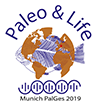
Das finale Programm können Sie HIER als pdf downloaden.
Die Abstracts können Sie HIER als pdf downloaden.
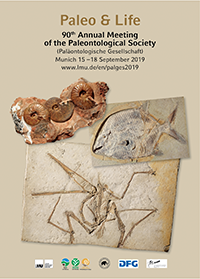 Wir freuen uns, die 90. Jahrestagung der Paläontologischen Gesellschaft (PalGes) vom 15.–18. September 2019 in München ankündigen zu können. Die Tagung ist als internationale Veranstaltung geplant, auf der Spitzenforschung aus der Paläontologie, Geobiologie und Paläobiologie präsentiert werden soll. Die PalGes ist eine der ältesten und größten paläontologischen Gesellschaften weltweit. München richtet die Jahrestagung nun zum fünften Mal aus (1950, 1960, 1985, 2010, 2019).
Wir freuen uns, die 90. Jahrestagung der Paläontologischen Gesellschaft (PalGes) vom 15.–18. September 2019 in München ankündigen zu können. Die Tagung ist als internationale Veranstaltung geplant, auf der Spitzenforschung aus der Paläontologie, Geobiologie und Paläobiologie präsentiert werden soll. Die PalGes ist eine der ältesten und größten paläontologischen Gesellschaften weltweit. München richtet die Jahrestagung nun zum fünften Mal aus (1950, 1960, 1985, 2010, 2019).
München, am Fuße der Alpen gelegen und von pittoresken Seen umgeben, ist Bayerns schöne Hauptstadt und gilt als eine der lebenswertesten Städte der Welt. München ist für seine Museen und Biergärten ebenso bekannt wie für seine Spitzenforschung in den Naturwissenschaften.
Unmittelbar nach der Tagung beginnt das Oktoberfest.
Vielen Dank an alle Teilnehmerinnen und Teilnehmer sowie an das Münchner Organisationsteam für eine gelungene Konferenz!
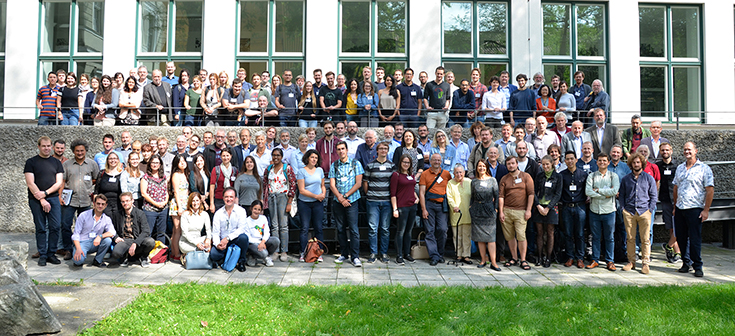
Photo: M. Schellenberger (SNSB-BSPG).
Das Photo in hoher Auflösung finden Sie HIER.
Organisation und Sponsoren
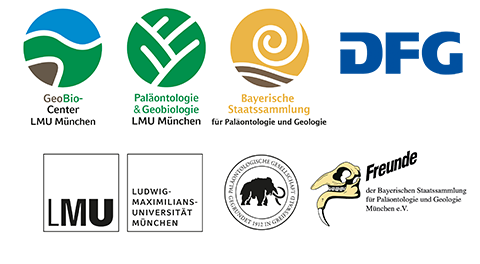
Veranstalter
- GeoBio-Center LMU
- Department für Geo- und Umweltwissenschaften der Ludwig-Maximilians Universität München, Paläontologie & Geobiologie
- SNSB-Bayerische Staatssammlung für Paläontologie und Geologie
- Paläontologische Gesellschaft
Ort
Department für Geo- und Umweltwissenschaften & Paläontologisches Museum
Richard Wagner Str. 10 und Luisenstr. 37
80333 München
Organisationsteam
- Alexander Nützel
- Carolin Haug
- Joachim Haug
- Michael Krings
- Mike Reich
- Bettina Reichenbacher
- Gert Wörheide
Kontakt
Ella Schönhofer, 089/2180 6630 (Sekretariat)
Alexander Nützel 0049-089/2180 6611
palges2019@palmuc.org
Teilnahmegebühren
| Early Bird (bis 15. Juli) |
Spätbucher (bis 15.8.) |
|
| Regulär, Mitglied PalGes oder GfbS | 210 € | 240 € |
| Regulär, nicht Mitglied | 270 € | 300 € |
| Student, Mitglied PalGes oder GfbS | 80 € | 110 € |
| Student, nicht Mitglied | 125 € | 155 € |
| Exkursion | 40 € | 40 € |
Konferenzgebühren enthalten das Conference Dinner und den Icebreaker
Mitglieder der Paläontologische Gesellschaft (PalGes) oder der Gesellschaft für biologische Systematik (GfbS) zahlen ermäßigte Gebühren. Werden Sie Mitglied, erhalten Sie eine Ermäßigung und unterstützen Sie die Paläontologie! https://www.palges.de/
Young Scientist Award
Nachwuchswissenschaftler und Nachwuchswissenschaftlerinnen (early career scientists) können sich auf den Young Scientist Award (YSA) für den besten Vortrag bewerben (1. Preis: 500€, 2.Preis: 300€, 3.Preis: 200€). Laut EGU sind early career scientists (ECS) undergraduates oder postgraduates (Master/PhD) Studierende oder Wissenschaftler bzw. Wissenschaftlerinnen, die ihren höchsten Abschluss (BSc, MSc oder Promotion) innerhalb der letzten sieben Jahre erhalten haben (Erziehungszeiten können berücksichtigt werden).
Falls Sie sich bewerben, klicken bei der Abstract-Einreichung auf “Young Scientist Award”!
PeerJ Award-open data
Für Bewerbungen kontaktieren Sie Kenneth de Baets kenneth.debaets@fau.de
Symposien
- Evolving ecosystems (Organizers: Alexander Nützel & Joachim Haug) more details
- Fossil fishes in the context of evolution, environments and biogeography (Organizers: Bettina Reichenbacher, Tomas Přikryl & Gloria Arratia)
more more details - Late Paleozoic and Mesozoic Plants and Floras (Organizers: Michael Krings, Benjamin Bomfleur & Christian Pott)
- Mikropaläontologie (Organizer: Anna Pint) more details
- Molecular Geobiology and Paleobiology (Organisation: Gert Wörheide, Dirk Erpenbeck, Sebastian Höhna, William Orsi) more details
- Physiology in Deep Time (Organizers: Uwe Balthasar, Kenneth De Baets, Carl Reddin, Nussaïbah Raja Schoob)
more details
Workshops
- Total-evidence divergence time estimation from extinct and extant taxa (Convener: Sebastian Höhna) more details
- Open data analysis and publication: from morphology to evolutionary patterns (Conveners: Emilia Jarochowska and Kenneth De Baets; Guest speakers: Melanie Hopkins & Stephan Lautenschlager)
The focus of this workshop is to highlight importance of new methods to improve scientific reproducibility and discuss best practices to share research in Paleontology. more details
Exkursionen
Vorexkursionen, 15.9.2019
- Wirbeltierpaläontologische Grabung Hammerschmiede, miozäne Molasse; Leitung: Madelaine Böhme
- Die oberjurassischen Plattenkalke von Solnhofen und Eichstätt (mit Besuch des Solnhofer Museums); Leitung: Martin Röper
Nachexkursionen, 19.9.2019
Paläontologie und Geologie des miozänen Nördlinger Rieskraters (mit Besuch des Rieskrater-Museums); Leitung: Stefan Hölzl
Programm
Tagungssprache ist Englisch, in Ausnahmefällen Deutsch.
Das finale Programm mit Zeitplan können Sie HIER als pdf downloaden.
Die Abstracts aller Vorträge und Poster können Sie HIER als pdf downloaden.
Sonntag, 15.9.2019
Arbeitskreistreffen, Vorstands- und Beiratssitzung, Vorexkursionen
ab 16:00 Uhr Registrierung
ab 17:00 Uhr Icebreaker
Montag, 16.9.2019
8:00 Registrierung
9:00–18:00 Auftakt, Plenary-Vorträge, Vorträge, Postersession
18:30 Mitgliederversammlung
Dienstag, 17.9.2019
8:00 –16:30 Vorträge

18:00-19:15 Öffentlicher Abendvortrag "Der Planet Erde und seine allerersten Bewohner" des bekannten Astrophysikers und Wissenschaftsjournalisten Harald Lesch, in der Botanischen Staatssammlung, Menzinger Str. 67, Großer Hörsaal (Theater)
(Foto: Gerald v. Foris)
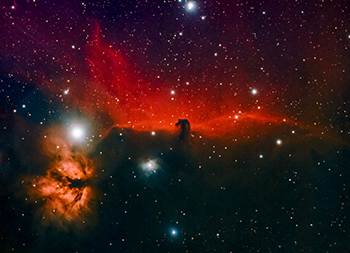
Pferdekopfnebel (Foto: Christian Schulbert, Erlangen)
19:30 Conference Dinner im Botanischen Garten
Mittwoch, 18.9.2019
9:00–16:00 Vorträge, Abschlussveranstaltung mit Plenary-Vortrag, Preisverleihungen
Donnerstag, 19.9.2019
Nachexkursionen, Arbeitskreistreffen
Zusätzliche Informationen zu Symposien und Workshops
Symposien
Evolving ecosystems
Organizers: Alexander Nützel & Joachim Haug
It is clear that ecosystems change over time. The possible reasons for that are manifold. First, environmental conditions such as climate or palaeogeography changed over time. At the same time the players i. e., the organisms evolved and new adaptations and ecological niches formed. Mass extinctions may have acted as game changers during this complex process. Our symposium aims to describe and interpret such changes. Case studies from all realms, both terrestrial and marine, and from all time intervals would be welcome as well as analytical big picture contributions.
Fossil fishes in the context of evolution, environments and biogeography
Organizers: Bettina Reichenbacher, Tomas Přikryl & Gloria Arratia
The total number of living fish species is approximately 33,600, which accounts for about 50% of all living vertebrate species. Exploring the evolutionary history of this unique diversity is not only a current issue for palaeontologists, but also provides key information for a general understanding of present-day aquatic ecosystems. Our primary goal in organizing this symposium is to exchange results of current studies and how these contribute to our understanding of the evolutionary history of fishes. We welcome oral or poster contributions dealing with the evolution, environments and biogeography of fossil fishes from all Periods and from all over the world. The more we know about the fossil record of fishes, the more engaging the questions will be. Our second aim is togather the paleo-ichthyological community to increase communication and collaboration among colleagues.
Mikropaläontologie
(Organizer: Anna Pint)
Microfossils are important tools in Quaternary Geology, Physical Geography, palaeooceanography, palaeoclimatology and geoarchaeology. Their assemblage composition, environmental induced morphological reactions and shell chemistry signatures enable reconstructing a wide range of environmental factors in aquatic or terrestrial ecosystems.
The small size of microfossils and their high diversity enable studying large associations, often with well preserved and complete individuals even from small samples as typical from sediment cores. Ecological preferences and tolerances of taxa are used for reconstruction of palaeoenvironments, their biostratigraphical ranges for bringing strata into a chronological order. The great value of microfossils for geoscience is their application but as past organisms they are excellent palaeontological study objects in their own as well. The session presents geological applications of microfossils as well as palaeobiological studies.
Molecular Geobiology and Paleobiology
Organizers: Gert Wörheide, Dirk Erpenbeck, Sebastian Höhna, William Orsi
Molecular geobiology and paleobiology uses molecular biological methods on extant organisms to address geoscience-relevant questions. Applications include reconstructing the metabolic capabilities of microbes in extreme environments, such as the deep biosphere, resolving animal evolution, including molecular clocks that integrate the fossil record with molecular phylogenies to estimate clade ages, as well as reconstructing molecular mechanisms and the evolution of microbial and animal biomineralization. This symposium will showcase recent advances in these areas that are central to geobiological and paleontological research and evolutionary (paleo)biology in general.
Physiology in Deep Time: from proxies to evolutionary trends
Organizers: Uwe Balthasar, Kenneth De Baets, Carl Reddin, Nussaïbah Raja Schoob
Organisms with different physiologies are expected to respond differently to global environmental changes. Future environments may resemble conditions that have not existed for millions of years. To assess strategies and conditions tolerated by particular organisms, it is necessary to understand how biomineralization, body size, environmental tolerance, metabolic rates, and physiological responses relate with the paleoenvironmental changes in the deep past. To address these questions, relevant proxies from modern organisms need to be combined with the fossil record. We welcome contributions focusing on individual groups, time-intervals, or large-scale temporal or organismal patterns across the geological record.
Workshops
Open Data and Analysis: from morphology to evolutionary patterns
Organizers: Kenneth De Baets & Emilia Jarochowska
Guest speakers: Melanie Hopkins (AMNH; part of PCI Palaeontology and PBDB), Stephan Lautenschlager (best practices for big data and 3D pdfs)
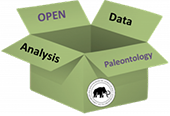 A key aspect of scientific research is reproducibility. This is also the case for paleontological research focusing on evolutionary or morphological patterns in deep time. Particularly relevant meta-data including sample size, qualitative and quantitative morphological information, stratigraphic and taphonomic context, as well age constraints can be crucial in ground-truthing scientific studies and making them reusable for further research. There is an increasing number of possibilities to make data and research available, ranging from large-scale database and novel publication opportunities to platforms which allow storing large data volumes. Two of them, Morphobank and Paleobiology Database, will be presented in the keynote by Dr. Melanie Hopkins. In cases where competition might be an issue, such platforms also allow embargoed access during initial research or peer review with a code of conduct. There are additional opportunities allowing publication of preprints (before and after peer-review) and one of them, PCI Paleo, will be presented in detail. Among other advantages, preprints may be a way to preserve valid scientific data which led to negative or inconclusive results that would not get published otherwise. Stephen Lautenschlager has been invited to present on the best way to make tomographic virtually available. The focus of this workshop is to highlight importance of new methods to improve scientific reproducibility and discuss best practices in sharing research. We invite contributions concerning the methods and tools fostering data sharing and reproducibility, positive and negative case studies, and all voices and opinions concerning the current obstacles and potential solutions in palaeontology. We plan to close our workshop with a joint discussion on future of Open Data and Analysis in our field.
A key aspect of scientific research is reproducibility. This is also the case for paleontological research focusing on evolutionary or morphological patterns in deep time. Particularly relevant meta-data including sample size, qualitative and quantitative morphological information, stratigraphic and taphonomic context, as well age constraints can be crucial in ground-truthing scientific studies and making them reusable for further research. There is an increasing number of possibilities to make data and research available, ranging from large-scale database and novel publication opportunities to platforms which allow storing large data volumes. Two of them, Morphobank and Paleobiology Database, will be presented in the keynote by Dr. Melanie Hopkins. In cases where competition might be an issue, such platforms also allow embargoed access during initial research or peer review with a code of conduct. There are additional opportunities allowing publication of preprints (before and after peer-review) and one of them, PCI Paleo, will be presented in detail. Among other advantages, preprints may be a way to preserve valid scientific data which led to negative or inconclusive results that would not get published otherwise. Stephen Lautenschlager has been invited to present on the best way to make tomographic virtually available. The focus of this workshop is to highlight importance of new methods to improve scientific reproducibility and discuss best practices in sharing research. We invite contributions concerning the methods and tools fostering data sharing and reproducibility, positive and negative case studies, and all voices and opinions concerning the current obstacles and potential solutions in palaeontology. We plan to close our workshop with a joint discussion on future of Open Data and Analysis in our field.
Award for Open Data Analysis and Publication in Paleontology: Early career research presenting on a topic related to Open Data and Analysis: from morphology to evolutionary patterns during the Annual Meeting of the Paläontologische Gesellschaft 2019 qualify for an award. The winner of the best presentation pertaining to Open Data and Analysis will be selected by an independent committee from among Early Career (up to 7 years after the PhD) conference presenters who applied for the award. The award will be sponsored by the PeerJ Awards Program of the PeerJ journal and will be followed by an interview for the PeerJ blog on the research of the winner as well as the opportunity of publishing an open access article free of charge (pending its gets through normal peer review).
The criteria for the award will be: the use of Open Access journals or preprint servers to make the presented research available, the use of Open Access archiving tools (such as Morphobank, PBDB and others) to make the data and/or code available to the community, the presenter’s demonstrated commitment to Open Access.
Total-evidence divergence time estimation from extinct and extant taxa
Organizer: Sebastian Höhna
1) Introduction to RevBayes, Bayesian inference, phylogenetics, etc
2) Estimating divergence times from molecular data only
3) Estimating divergence times from molecular data and fossil occurrences using the fossilized-birth-death process
4) Estimating divergence times from molecular and morphological data using the fossilized-birth-death process

